Rocket Lab launches Electron rocket, selects Virginia for Neutron factoryby Jeff Foust — March 1, 2022 [SN]
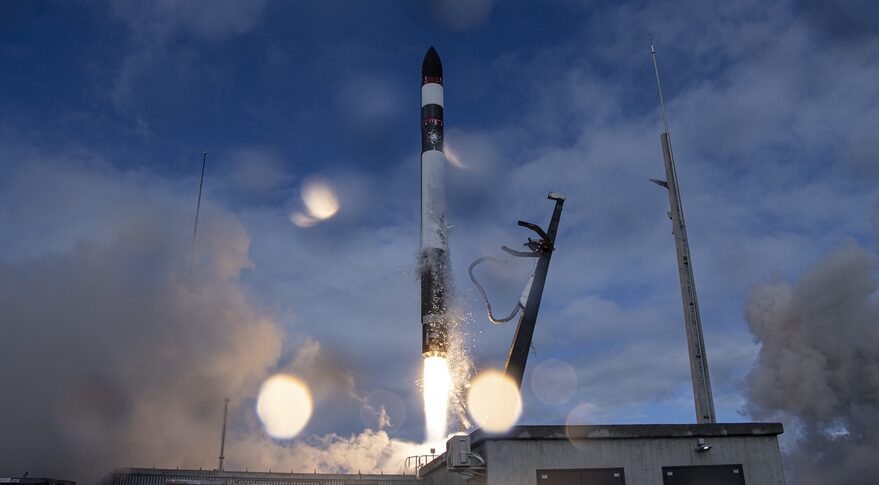 An Electron rocket lifts off from the new Pad B at Launch Complex 1 in New Zealand Feb. 28 carrying a Japanese radar imaging satellite. Credit: Rocket Lab
An Electron rocket lifts off from the new Pad B at Launch Complex 1 in New Zealand Feb. 28 carrying a Japanese radar imaging satellite. Credit: Rocket LabWASHINGTON — Rocket Lab carried out its first Electron launch of the year Feb. 28, placing a Japanese radar imaging satellite into orbit at the same time the company released its financial results and selected Virginia for a rocket factory.
Source:
https://spacenews.com/rocket-lab-launches-electron-rocket-selects-virginia-for-neutron-factory/E-Space taps Rocket Lab to launch three demo sats by Julyby Jason Rainbow — March 21, 2022 [SN]
 “E-Space will increase the speed for constellation delivery from years to months, allowing new opportunities for more people to access space-based platforms,” E-Space founder and CEO Greg Wyler said in a statement. Credit: E-Space
“E-Space will increase the speed for constellation delivery from years to months, allowing new opportunities for more people to access space-based platforms,” E-Space founder and CEO Greg Wyler said in a statement. Credit: E-SpaceWASHINGTON — Rwanda-backed megaconstellation startup E-Space said March 21 it has contracted Rocket Lab to launch three demo satellites in the second quarter of this year.
The spacecraft aim to validate systems and technology for a broadband network that, according to founder and CEO Greg Wyler, will use satellites with significantly smaller cross-sections than other megaconstellations to reduce the risk of in-orbit collisions.
Source:
https://spacenews.com/e-space-taps-rocket-lab-to-launch-three-demo-sats-by-july/Rocket Lab launches BlackSky satellites as it prepares for mid-air booster recoveryby Jeff Foust — April 2, 2022 [SN]
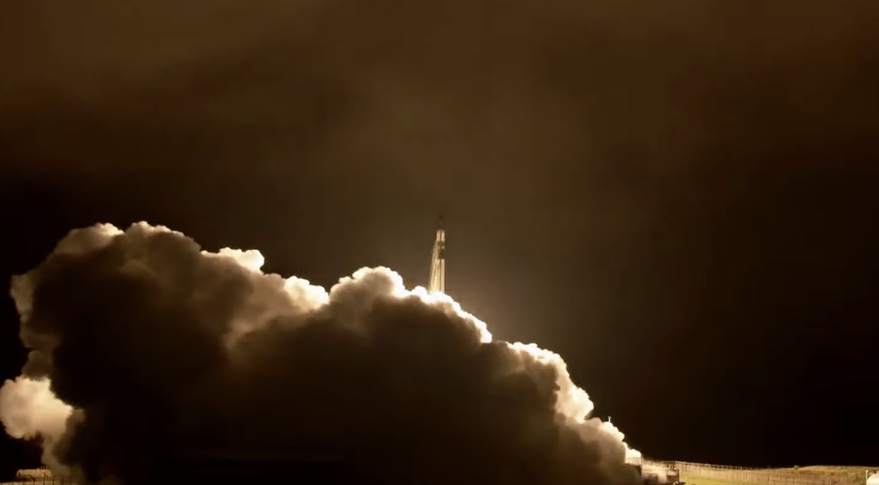 A Rocket Lab Electron lifts off April 2 carrying two BlackSky imaging satellites. Credit: Rocket Lab webcast
A Rocket Lab Electron lifts off April 2 carrying two BlackSky imaging satellites. Credit: Rocket Lab webcastWASHINGTON — A Rocket Lab Electron launched another pair of imaging satellites for BlackSky April 2 as the company gears up to attempt recovery of the rocket’s first stage. (...)
The launch was the latest in a series of Electron launches of BlackSky satellites arranged by Spaceflight. That deal included launches of pairs of BlackSky satellites in November and December 2021 as well as a failed Electron launch in May 2021.
Rocket Lab said March 24 that the launch, the second Electron flight of the year, was previously scheduled for March but postponed by weather. Because of the delay of the launch, revenue from the launch would be recognized in its fiscal second quarter rather than its first. The company updated its revenue projection for the first quarter from $42–47 million to approximately $40 million. (...)
https://spacenews.com/rocket-lab-launches-blacksky-satellites-as-it-prepares-for-mid-air-booster-recovery/Commercial BlackSky imaging satellites ride with Rocket LabApril 2, 2022 Stephen Clark
 Rocket Lab’s Electron launcher streaks into the night sky over New Zealand with two BlackSky imaging satellites. Credit: Rocket Lab / Joseph Baxter
Rocket Lab’s Electron launcher streaks into the night sky over New Zealand with two BlackSky imaging satellites. Credit: Rocket Lab / Joseph Baxter(...) The spacecraft, each about the size of a small refrigerator, were stacked one on top of the other for launch, fixed to a dual-payload adapter structure. The upper satellite deployed first, followed by separation of the adapter, then the release of the satellite in the lower berth.
A member of Rocket Lab’s launch team at mission control in Auckland, New Zealand, declared “mission success” moments after telemetry confirmed separation of the two BlackSky satellites. (...)
 Ground teams integrate a BlackSky satellite with Rocket Lab’s kick stage in New Zealand. Credit: Rocket Lab
Ground teams integrate a BlackSky satellite with Rocket Lab’s kick stage in New Zealand. Credit: Rocket LabEach BlackSky satellite weighs about 121 pounds (55 kilograms). The satellites are built by LeoStella, a joint venture between BkackSky and Thales Alenia Space, a major European satellite manufacturer. LeoStella’s production facility is located in Tukwila, Washington, a suburb of Seattle.
BlackSky, with offices in Seattle and Herndon, Virginia, is deploying a fleet of small remote sensing satellites to provide high-resolution Earth imagery to commercial and government clients.
One big customer for BlackSky, with offices near Seattle and in the Washington, D.C., metro area, is the U.S. military and intelligence agencies. BlackSky has agreements to sell commercial imagery to NASA, the National Reconnaissance Office and the National Geospatial-Intelligence Agency.
BlackSky said the launch Saturday expanded the company’s fleet to 14 satellites.
https://spaceflightnow.com/2022/04/02/commercial-blacksky-imaging-satellites-ride-with-rocket-lab/E-Space sheds more light on sustainable megaconstellation planby Jason Rainbow — April 7, 2022 [SN]
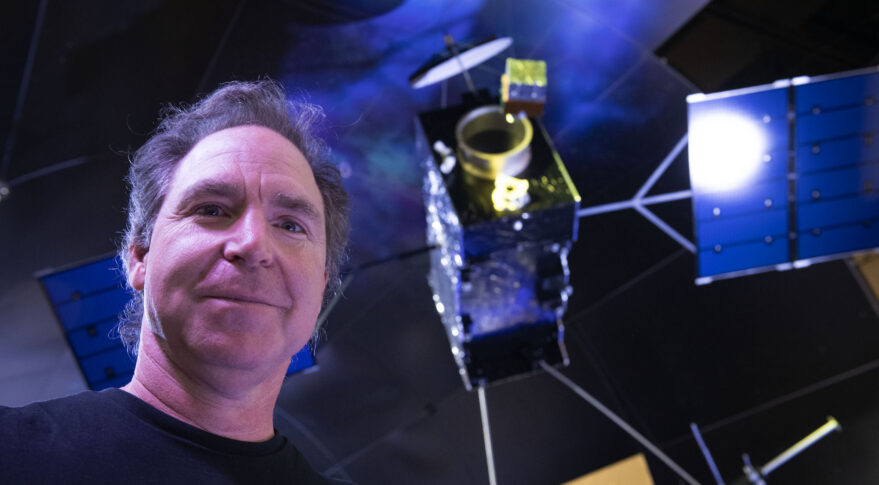 Veteran space entrepreneur Greg Wyler founded O3b and OneWeb before turning his attention to E-Space. Credit: Chuck Bigger
Veteran space entrepreneur Greg Wyler founded O3b and OneWeb before turning his attention to E-Space. Credit: Chuck BiggerCOLORADO SPRINGS — Megaconstellation startup E-Space is preparing to deploy the first of potentially hundreds of thousands of satellites on a Rocket Lab mission slated for no earlier than April 19.
Three E-space prototypes are part of the 34 payloads that Rocket Lab said April 5 are on the upcoming mission, including satellites for Alba Orbital, Astrix Astronautics, Aurora Propulsion Technologies, Unseenlabs and Swarm Technologies.
Rocket Lab will also attempt a mid-air helicopter capture of its Electron launch vehicle for the first time after the flight. The launch is set to commence within a 14-day window starting on April 19 and represents a major step in Rocket Lab’s plans to make the rocket reusable.
https://spacenews.com/e-space-sheds-more-light-on-sustainable-megaconstellation-plan/Rocket Lab confirms plan to catch booster with helicopter later this monthApril 11, 2022 Stephen Clark [SFN]
 A modified Sikorsky S-92 helicopter will attempt to catch a descending Rocket Lab booster in mid-air during the company’s next mission. Credit: Rocket Lab
A modified Sikorsky S-92 helicopter will attempt to catch a descending Rocket Lab booster in mid-air during the company’s next mission. Credit: Rocket LabRocket Lab plans the first attempt to catch one of its returning small satellite boosters by helicopter after a launch later this month, nearly three years after the company announced its mid-air recovery and reuse concept.
The next Rocket Lab mission is set to lift off from New Zealand no earlier than April 19 with 34 small satellites from commercial operators Alba Orbital, Astrix Astronautics, Aurora Propulsion Technologies, E-Space, Unseenlabs, and Swarm Technologies, the company said April 5.
https://spaceflightnow.com/2022/04/11/rocket-lab-confirms-plan-to-catch-booster-with-helicopter-later-this-month/Rocket Lab to launch HawkEye 360 satellites on first Wallops Electron missionby Jeff Foust — April 20, 2022 [SN]
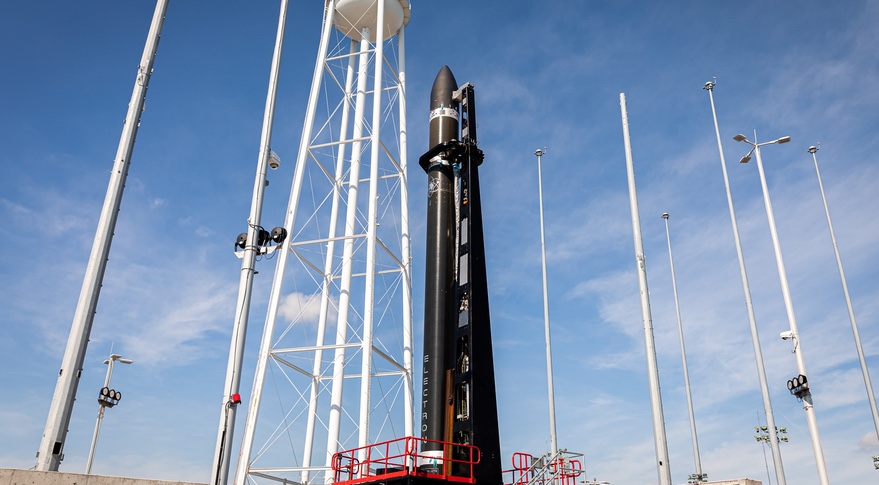 Rocket Lab says its first Electron launch from Wallops Island, Virginia, will be no earlier than December carrying satellites for HawkEye 360. Credit: Rocket Lab
Rocket Lab says its first Electron launch from Wallops Island, Virginia, will be no earlier than December carrying satellites for HawkEye 360. Credit: Rocket LabWASHINGTON — The long-delayed first launch of a Rocket Lab Electron rocket from Virginia is now scheduled for late this year, carrying satellites for HawkEye 360.
Rocket Lab announced April 19 it signed a contract with HawkEye 360 to deliver 15 satellites over three launches. Two of the launches will be dedicated flights, carrying six satellites each, while the third will carry three satellites on a rideshare mission with other customers.
https://spacenews.com/rocket-lab-to-launch-hawkeye-360-satellites-on-first-wallops-electron-mission/Rocket Lab launches smallsats, catches but drops boosterby Jeff Foust — May 2, 2022 [SN]
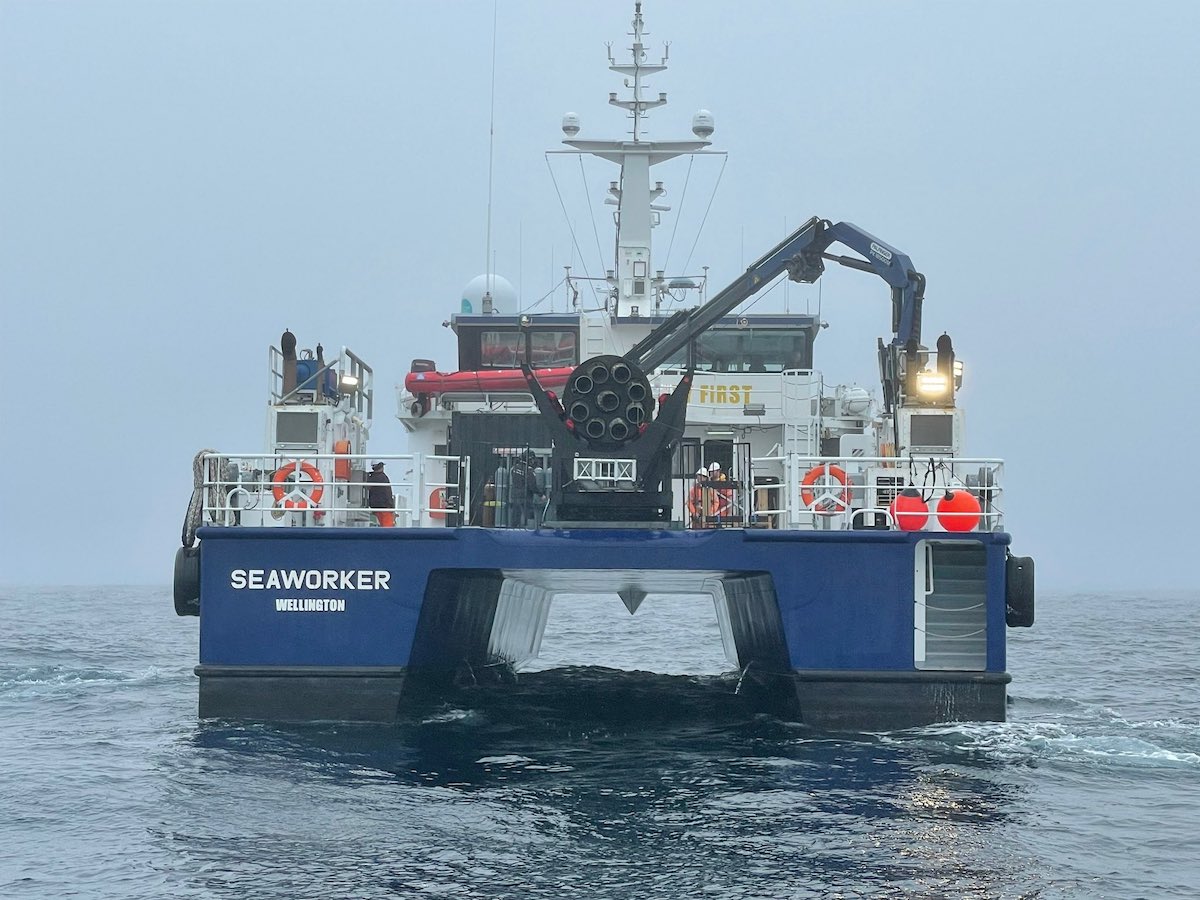 Rocket Lab’s Electron booster on-board the company’s recovery ship. Peter Beck, the company’s chief executive, says the booster is in good shape, and the engine positions visible here are a result of the vehicle’s thrust vector control, or gimbal, system, and not damage from re-entry or splashdown. Credit: Rocket Lab
Rocket Lab’s Electron booster on-board the company’s recovery ship. Peter Beck, the company’s chief executive, says the booster is in good shape, and the engine positions visible here are a result of the vehicle’s thrust vector control, or gimbal, system, and not damage from re-entry or splashdown. Credit: Rocket LabWASHINGTON — Rocket Lab declared success in its effort to catch an Electron booster in midair after launch May 2, even though the helicopter had to release the booster moments later.
The Electron rocket lifted off from the company’s Launch Complex 1 in New Zealand at 6:49 p.m. Eastern after a brief hold in the countdown. The rocket’s ascent went as planned, with the kick stage, carrying a payload of 34 smallsats, reaching orbit about 10 minutes later.
https://spacenews.com/rocket-lab-launches-smallsats-catches-but-drops-booster/Rocket Lab briefly catches booster in mid-air after successful launchMay 3, 2022 Stephen Clark [SFN]
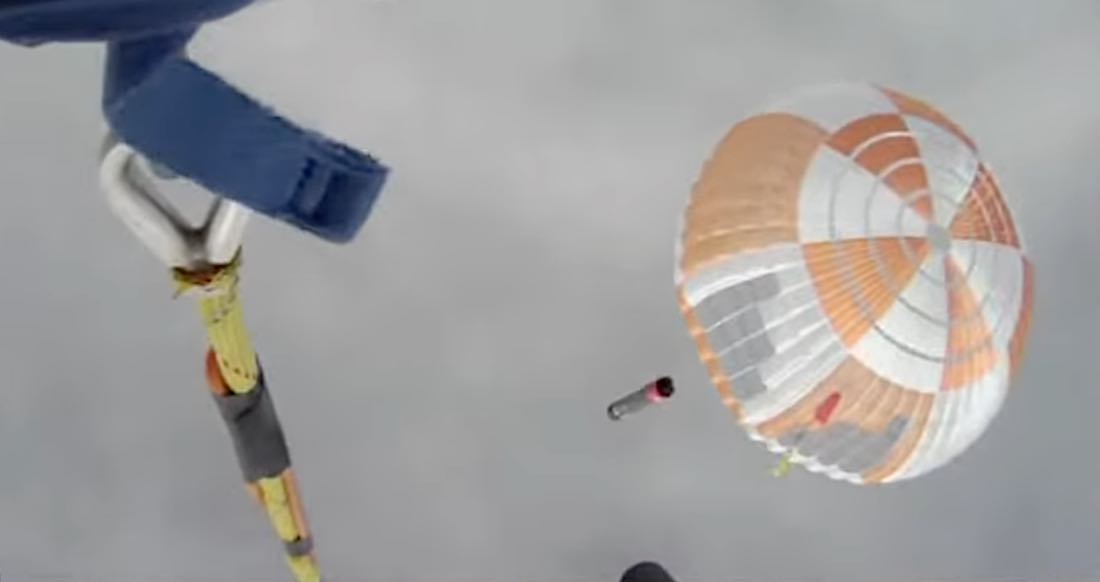 A camera on Rocket Lab’s recovery helicopter shows the Electron booster under its parachute following launch Monday. Credit: Rocket Lab
A camera on Rocket Lab’s recovery helicopter shows the Electron booster under its parachute following launch Monday. Credit: Rocket LabRocket Lab used a helicopter to capture a spent Electron first stage booster and its parachute after launching satellites from New Zealand Monday, a significant step forward for the company’s rocket recovery and reuse program. The helicopter dropped the rocket a few seconds later.
The rocket splashed down in the Pacific Ocean under its parachute, and Rocket Lab’s recovery ship pulled the booster from the sea. Peter Beck, Rocket Lab’s CEO, said the vehicle was in good shape and didn’t rule out reusing the rocket in a post-flight conference call with reporters. (...)
The successful mid-air catch of the descending Electron rocket came nearly three years after Rocket Lab announced its plan to recover and reuse first stage boosters.
Before adding the helicopter to the mix, Rocket Lab completed three experimental rocket recoveries from the Pacific Ocean. Those splashdowns under parachutes were experiments designed to gather data on the structural loads, heating, and deceleration the Electron booster encounters during re-entry and descent.
Rocket Lab tested the rocket’s drogue and main parachute designs, demonstrated the use of cold gas thrusters to re-orient the rocket in space, and validated a heat shield to protect the booster and its engines during re-entry.
A customized Sikorsky S-92 helicopter was outfitted to snare the one-ton carbon fiber booster stage suspended under a parachute around 170 miles (280 kilometers) off the coast of New Zealand.
Catching the booster in mid-air prevents it from reaching the ocean, eliminating the risk of hardware corrosion or damage from splashdown in salt water, and easing refurbishment work required to make the rocket suitable to launch again.
The Electron booster is powered by nine kerosene-fueled Rutherford engines. The rocket, standing nearly 60 feet (18 meters) tall on the launch pad, also has a single-engine second stage, and a third stage capable of placing small payloads into orbit. (...)
The payloads included
24 tiny satellites for Swarm Technologies, a company owned by SpaceX which runs a commercial low data rate relay network. Swarm’s “SpaceBEE” satellites are about the size of a slice of bread.
Three demonstration satellites for the startup company E-Space were also launched Monday. The demo sats will test technologies for a planned constellation of small communications spacecraft — which E-Space says could number 100,000 — in low Earth orbit. E-Space is based in the United States and France, and was established by Greg Wyler, founder of O3b Networks and OneWeb.
Rocket Lab also deployed the
BRO 6 smallsat for the French company Unseenlabs, which is fielding a maritime and ship surveillance constellation. Aurora Propulsion Technologies, based in Finland, also launched a test satellite named
AuroraSat 1 to test a water-based propulsion system for CubeSats.
The mission also launched
four small “PocketQubes” in a package for Alba Orbital, a Scottish company.
The PocketQubes weighed between 1 and 2 pounds at launch, and included Alba’s Unicorn 2F and three satellites for Acme AtronOmatic, owner of the popular MyRadar weather app.
Acme said the prototype satellites will validate hardware for a planned fleet of small satellites, known as the Hyperspectral Orbital Remote Imaging Spectrometer, or HORIS, constellation.
The HORIS constellation will provide Earth observation data, enhanced by artificial intelligence and machine learning technology, to Acme’s customers and help integrate new services to the MyRadar app, the company said in a press release in March.
Another payload remained attached to Rocket Lab’s kick stage to test an inflatable solar array system for the New Zealand company Astrix Astronautics.
https://spaceflightnow.com/2022/05/03/rocket-lab-briefly-catches-booster-in-mid-air-after-successful-launch/Space systems dominate Rocket Lab revenueby Jeff Foust — May 17, 2022 [SN]
 Rocket Lab carried out only one Electron launch in the first quarter, a factor in the company's lopsided split between launch and space systems revenue in the quarter. Credit: Rocket Lab
Rocket Lab carried out only one Electron launch in the first quarter, a factor in the company's lopsided split between launch and space systems revenue in the quarter. Credit: Rocket LabWASHINGTON — Rocket Lab, the company best known for its Electron small launch vehicle, generated most of its first quarter revenue from other space systems and not launch itself.
In quarterly earnings released May 16, Rocket Lab reported $40.7 million in revenue for the first quarter of 2022, a net loss of $26.7 million and an adjusted earnings before interest, taxes, depreciation and amortization (EBITDA) loss of $8 million.
https://spacenews.com/space-systems-dominate-rocket-lab-revenue/NRO space missions mark new level of US-Australia cooperationby Sandra Erwin — July 12, 2022 [SN]
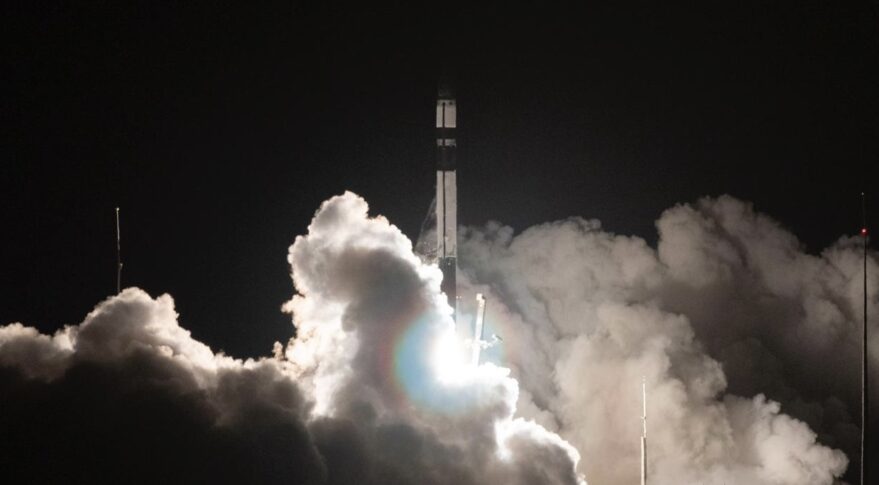 Rocket Lab launched the NROL-162 mission for the U.S. National Reconnaissance Office July 13, 2022, rom the company's launch complex in New Zealand. Credit: Rocket LabNROL-162 and NROL-199 carry spy satellites built and operated jointly by the U.S. and Australia
Rocket Lab launched the NROL-162 mission for the U.S. National Reconnaissance Office July 13, 2022, rom the company's launch complex in New Zealand. Credit: Rocket LabNROL-162 and NROL-199 carry spy satellites built and operated jointly by the U.S. and AustraliaWASHINGTON — Rocket Lab on July 13 launched the NROL-162 mission for the U.S. National Reconnaissance Office from the company’s launch complex in New Zealand. NROL-162 is the first of two NRO missions the agency developed in partnership with the Australian Department of Defence.
https://spacenews.com/nro-space-missions-mark-new-level-of-us-australia-cooperation/Rocket Lab’s next launch for the NRO postponed for software updatesJuly 18, 2022 Stephen Clark [SFN]
 File photo of two Electron rockets on Rocket Lab’s two launch pads in New Zealand. Credit: Rocket Lab
File photo of two Electron rockets on Rocket Lab’s two launch pads in New Zealand. Credit: Rocket LabRocket Lab’s next mission for the National Reconnaissance Office — the second of two back-to-back launches for the U.S. spy satellite agency — has been postponed to complete a software update on the classified payload, the NRO said Monday.
https://spaceflightnow.com/2022/07/18/rocket-labs-next-launch-for-the-nro-postponed-for-software-updates/Rocket Lab launches top secret payload for U.S. spy satellite agencyAugust 4, 2022 Stephen Clark [SFN]
 Rocket Lab’s Electron launch vehicle takes off from New Zealand Thursday on the NROL-199 mission. Nine Rutherford engines powered the rocket off the pad. Credit: Rocket Lab
Rocket Lab’s Electron launch vehicle takes off from New Zealand Thursday on the NROL-199 mission. Nine Rutherford engines powered the rocket off the pad. Credit: Rocket LabRocket Lab launched its third mission in a little more than five weeks Thursday in New Zealand, deploying a small classified payload in orbit for the National Reconnaissance Office and continuing the busiest stretch of missions in the company’s history.
https://spaceflightnow.com/2022/08/04/rocket-lab-launches-top-secret-payload-for-u-s-spy-satellite-agency/Indian launch gives OneWeb enough satellites for global internet serviceMarch 26, 2023 Stephen Clark [SFN]
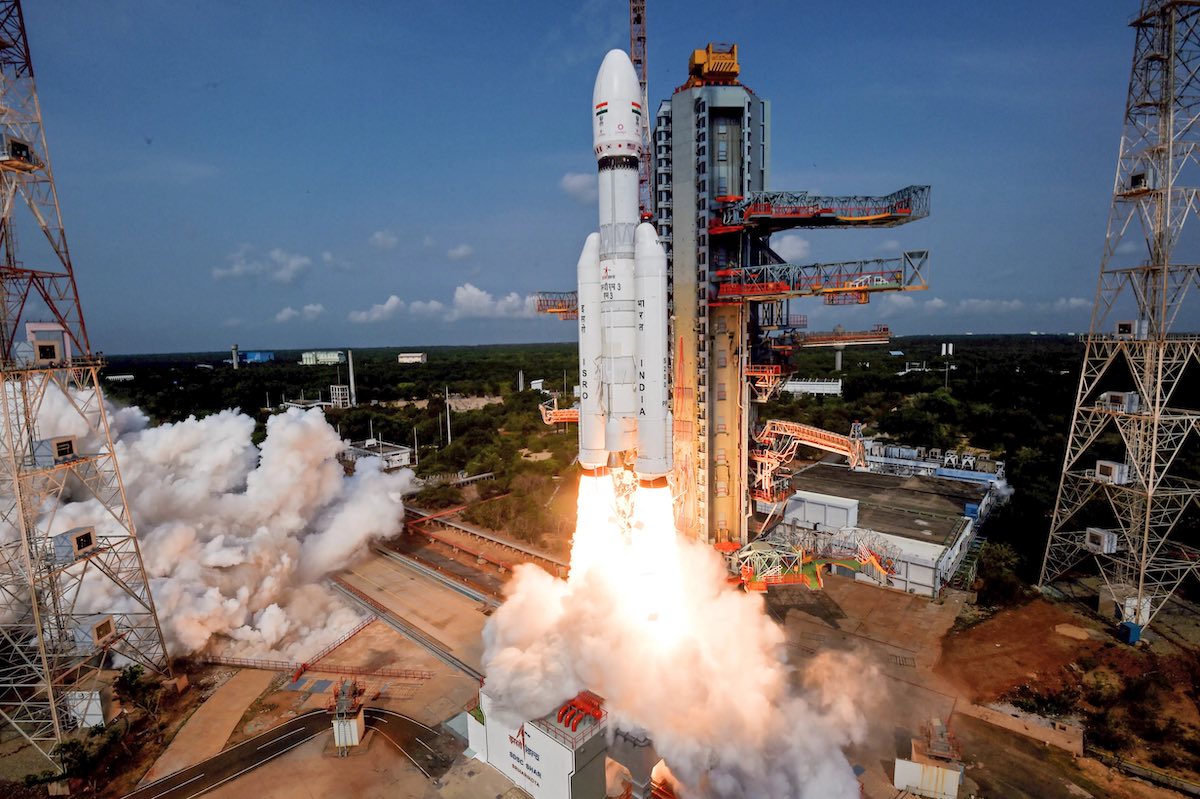 India’s LVM3, or GSLV Mk.3, rocket lifts off from the Satish Dhawan Space Center with 36 OneWeb satellites. Credit: ISRO
India’s LVM3, or GSLV Mk.3, rocket lifts off from the Satish Dhawan Space Center with 36 OneWeb satellites. Credit: ISROThe successful launch of 36 more OneWeb satellites aboard India’s most powerful rocket Saturday brought the total number of OneWeb spacecraft in orbit to 618, enough for the London-based company to start global broadband service later this year.
https://spaceflightnow.com/2023/03/26/indian-launch-gives-oneweb-enough-satellites-for-global-internet-service/